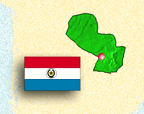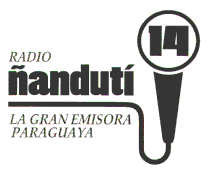The second event of note in Paraguay was on May 26 when free elections for mayors were held for the first time in the country's history. These were only the second free elections in Paraguay's history. The first ones elected a president in May, 1989, just after the overthrow of Alfredo Stroessner, dictator for 35 years. Although Paraguay never had a freely elected government until two years ago, that's not to say Pargaguay was unstable. It was ruled by a series of stable long-term dictators like Stroessner. There were even two political parties, the Colorados and the Liberals, which jockeyed for power via dictatorship. Perhaps it's not surprising that the people in the capital of Asuncion rejected the two traditional parties and elected an independent doctor and union leader as mayor. Another interesting thing about Paraguay is that it is an officially bilingual country. When Spain colonized
Paraguay in the 1500s, it was inhabited by the Guarani
Indians. Thanks especially to the efforts of Jesuit
missionaries, the Guaranis were able to retain some of
their culture, including their language. Spanish and
Guarani grew side by side. Today Guarani is considered
a symbol of the nation culture. Unlike many bilingual
countries where different groups of people in different
areas speak different native languages, in Paraguay almost
everyone everywhere speaks both languages as native languages.
Children learn both languages naturally as they grow up.
People normally use Spanish in business, education, and
government, and Guarani for family matters and chatting
with friends. It wouldn't be unusual for two businessmen
to use Spanish to conduct a deal, then converse in Guarani
over lunch.
The easiest way to hear SWBC from Paraguay
is to tune in Radio Nacional on 9735v. The 100 kw transmitter
is only operated at an inefficient 35 kw, but it gets out
rather well when there's no QRM around. It can sometimes
be heard in the evening, but the best time to try is early
mornings around 0900. Don't let the early hour dissuade you.
Radio Nacional de Paraguay's morning program features a lot
of upbeat Paraguayan harp music which will surely wake you up!
The talk will be primarily in Spanish with occasional stretches
Well, amigos, that looks like it for another
column. The new DX season is rapidly approaching, and with
it, surely some new catches and interesting broadcasts.
Isn't it nice to have something to look forward to when summer
comes to an end?
1996 Addendum:Radio Nacional de Paraguay continues to be
a reliable morning catch on 9735 and can sometimes be heard
in the late afternoonand early evening as well (North American
local time). Radio Encarnacion continues to be sporadically
heard.
2004 Addendum: Radio Nacional continues to use 9735 kHz, variable to around 9737 kHz.
This website is maintained by Don Moore,
Paraguay Menu
Main Menu
What's New
Best of this Site
Radio History
Clandestine Radio
Notes on Paraguay
By Don Moore

Happenings in Paraguay
Next on the agenda is Paraguay. Usually Paraguay is pretty well
ignored by the rest of the world, but two recent events there
deserve mention. First, the massive Itaipu hydroelectric project
was officially inaugurated on May 18. The world's largest dam
& hydroelectric plant, it is located on the Parana River, half
in Paraguay and half in Brazil - and jointly owned and operated
by the two countries. Itaipu has 18 turbines producing a total
of 12,600 megawatts of power. The electricity is split 50/50
between the two countries, but tiny Paraguay only needs 2% of
the power to meet all its needs for electricity. So, Paraguay
sells the remainder of its share to Brazil. Together with
Brazil's share, that meets 35% of Brazil's huge needs -
and the sale of elctricity to Brazil pays for over a quarter
of Paraguay's national budget.
 What a deal! Paraguay is
currently working on similar, although smaller projects on its
other river boundaries with Brazil and Argentina. Who knows - they may eventualy be able to finance their entire national budget by selling hydroelectric power!
What a deal! Paraguay is
currently working on similar, although smaller projects on its
other river boundaries with Brazil and Argentina. Who knows - they may eventualy be able to finance their entire national budget by selling hydroelectric power!  in Guarani. Guarani doesn't sound anything like Spanish,
although some Spanish words have crept into the language.
Otherwise, Paraguay has several frequently inactive stations.
The best bet would be Radio Encarnacion on 11944v in the
evenings.
in Guarani. Guarani doesn't sound anything like Spanish,
although some Spanish words have crept into the language.
Otherwise, Paraguay has several frequently inactive stations.
The best bet would be Radio Encarnacion on 11944v in the
evenings.
Hasta luego & 73s, 
Association of North American Radio Clubs
DXer of the Year for 1995.